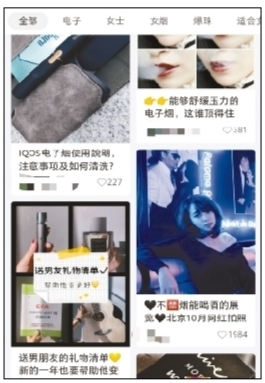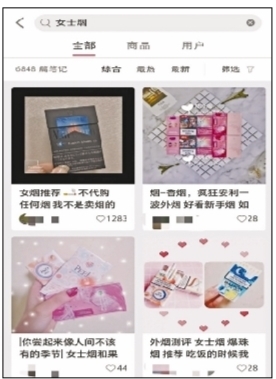There are 95,000 soft articles in the "Little Red Book" "APP, which is flooded with tobacco advertisements on the Internet.



Although the state explicitly prohibits it, there are still a large number of tobacco advertisements on the Internet and they are more hidden. Yesterday, Beijing CDC released the monitoring results of Internet impact data in China in 2018. The Internet platform with many young users and relatively lack of supervision has become the hardest hit area of tobacco marketing. In addition, in some lifestyle sharing apps with the slogan of "finding a better life", there are also a lot of tobacco marketing information for women. According to a survey conducted by Beijing Youth Daily reporter, there are more than 90,000 pieces of marketing information related to "cigarettes" only on the "Little Red Book" APP, and most of these information are developed in the form of "evaluation" and "planting grass", which has attracted a lot of readers’ attention.
issue
Nearly 15% of the Internet tobacco advertisements are flooding, playing a "feeling card"
According to the "Monitoring Report on Internet Tobacco Marketing Data in 2018" issued by the Municipal Center for Disease Control and Prevention, from January to June 2018, a total of 51,892 pieces of information related to tobacco advertisements and promotions, 7,289 pieces of tobacco news and 47,304 pieces of discussion by smokers were captured. Among the information related to tobacco advertising and promotion, tobacco agents have the most sales information, accounting for 39,507, accounting for 76.13%; 1959 pieces of tobacco purchasing sales information, accounting for 3.78%; 1977 tobacco advertising messages, accounting for 3.81%; There are 265 pieces of tobacco sponsorship information, accounting for 0.51% of the total.
Zeng Xiaoyu, deputy director of Beijing CDC, said that at present, men are still the main consumers of cigarettes in China, but on the Internet platform, women and teenagers are becoming the main targets of tobacco marketing information. The monitoring found that there are a lot of tobacco marketing information (2051 articles) on some shopping guide sharing platforms mainly for women, and on these life sharing platforms, female users account for about 70%. Besides "smoking" and "smoking", "exploding beads", "fine branches" and "loving happiness" have also become the most popular keywords for women to discuss.
At the same time, the Internet platform with many young users and relatively lack of supervision has also become the hardest hit area of tobacco marketing. Among the 14 monitored online platforms, the most information about tobacco advertisements and promotions was captured from Weibo, accounting for 42,834 pieces, accounting for 82.54%. On March 15th, 2019, Sina Weibo Data Center released the latest "2018 Weibo User Development Report", which showed that young users aged 18-30 accounted for 75% of users of Weibo platform. It can be seen that women and teenagers are becoming the main targets of tobacco marketing information.
The Interim Measures for the Administration of Internet Advertising clearly stipulates that it is forbidden to use the Internet to publish tobacco advertisements. However, with the rapid development of Internet industry and the change of Internet communication mode, tobacco online marketing still exists in large numbers. It is worth mentioning that, compared with traditional advertising forms, tobacco marketing information on the Internet platform is more embedded in a soft way, which is more concealed.
The reporter of Beiqing Daily noticed that a large number of soft information and pseudo-scientific information related to tobacco advertisements and promotions were found in this monitoring. Among them, 7766 pieces of sentimental soft text information were captured, accounting for 14.97%. These sentimental soft articles spread tobacco information, beautify smoking behavior and enhance public recognition of tobacco brands by exaggerating the relationship between tobacco and love, friendship and affection.
At the same time, this monitoring also captured 418 pieces of tobacco-related pseudo-scientific information, spreading pseudo-scientific information contrary to science, so as to strengthen brand awareness and attract more potential customers. These hidden advertising messages will bring difficulties and challenges to the supervision work of relevant departments.
survey
The "planting grass" tobacco-related soft text on APP attracts a large number of female users’ attention.
According to a survey conducted by the reporter of Beiqing Daily, there are many tobacco marketing articles in some apps that are mainly female users and were originally used for "lifestyle sharing" and "planting grass", which achieve the purpose of "advertising" through soft communication and mainly promote "cigarettes suitable for women".
On an APP called "Little Red Book", the reporter entered the word "smoke" to search, and the page suggested that there were 95,000 "notes". The second keyword was "Ms" and the third was "female smoke". The topic recommended on this page is "E-cigarette". After clicking in, there are 2,656 notes in the topic of "E-cigarette", with a total of 4.916 million views. Search for "ladies’ cigarettes" and you can see 6848 notes. Just open one of them, and you will see that these articles are all tobacco information displayed in the form of "evaluation" and "experience report". And this kind of "planting grass" that doesn’t look like an advertisement has attracted the attention of many readers.
For example, there is an article titled "Hard-core Young Electronic Cigarette, Rejecting Secondhand Smoke" on the home page. I thought it was to discourage smoking, but after opening it, I introduced an electronic cigarette product. Another article is entitled "Girl’s Heart | I’ve been thinking for a long time whether to buy XXX or not, so I’ll share my evaluation with you". At the beginning of the article, I wrote: "Smoking is harmful to health", and then I introduced a cigarette in more than 1,000 words, which won 4,168 likes and 698 comments, and 4,837 users collected this article. The first comment reads: "A non-smoker has carefully read every word!"
"This soft implant is hidden, not in the traditional sense ‘ Advertising ’ But in fact, it is still for the purpose of advertising. Many publishers are behind tobacco marketing agencies. " A staff member who has been engaged in tobacco control public welfare for a long time told the reporter of Beiqing Daily, "And these lifestyles share APP, and the main target is women, and women have become the main target of tobacco online marketing."
The reporter of Beiqing Daily learned that in 2016, China issued the Interim Measures for the Administration of Internet Advertising, which prohibited the use of the Internet to publish tobacco advertisements. Previously, Article 13 of the WHO Framework Convention on Tobacco Control stated that tobacco advertising, promotion and sponsorship were completely prohibited. The newly revised Advertising Law of People’s Republic of China (PRC) in 2015 also clearly stipulates that "it is forbidden to publish tobacco advertisements in mass media or public places, public transport and outdoors; It is forbidden to send any form of tobacco advertisements to minors. "
respond
Continue to monitor tobacco marketing information and deal with suspected offenders.
The reporter of Beiqing Daily learned that this Internet tobacco marketing data monitoring was jointly carried out by the Beijing Center for Disease Control and Prevention and the Social Media Research Center of Peking University New Media Research Institute. The monitoring adopts the technology of automatic keyword recognition by web crawler, and conducts a preliminary investigation and research on the advertising and promotion release status of some tobacco enterprises on the Internet in China. The monitoring time is from January 1 to June 30, 2018, mainly from four aspects: the number of tobacco advertising and promotion information released, the characteristics and new trends of tobacco advertising and promotion information on various network platforms, the case analysis of typical online tobacco advertising and services, and the characteristics of tobacco information publishers. After three rounds of argumentation by tobacco control industry experts, legal experts, market supervision experts and network management experts, the information is classified, judged and prevention and control measures are sorted out, with a view to providing help for tobacco marketing information supervision on the Internet platform in China.
The Beijing Center for Disease Control and Prevention said that the next step will be to conduct in-depth research from the following three aspects to provide a basis for purifying China’s Internet tobacco control environment: First, continue to monitor the Internet tobacco marketing situation, dig deep into monitoring data, collect typical cases, and publish monitoring results regularly; Second, strengthen the cooperation of relevant government departments, screen typical cases, and submit cases suspected of violating the Advertising Law to relevant departments for handling; The third is to organize experts to sort out and refute pseudo-scientific information, make full use of the Internet to strengthen tobacco control education and legal education for the public, mobilize social supervision forces, and purify the Internet environment.
Text/Beijing Youth Daily reporter Zhang Xiaomei